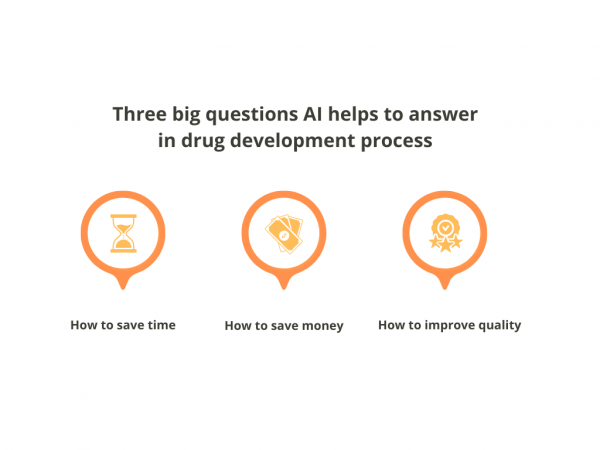Three big questions AI helps to answer in drug development process
February 27, 2023

There are three big questions in any industry, including pharmaceuticals & clinical trials:
- How to save time?
- How to save money?
- How to improve the quality?
Artificial intelligence is one of the new answers to all of them. Here are a few examples:
When it comes to saving time, AI is here to take over data processing – fishing for answers to most minor questions in huge data loads, comparing records, and even making decision-leading suggestions. In Flex Databases Pharmacovigilance, for example, AI takes over signal detection by analysing cases and highlighting possible signals with matching conditions and reactions.
In addition, AI can process enormous amounts of data and build predictive analysis, which allows for forecasting patient deterioration and avoiding emergencies. AI assists in site selection and patient search making huge and complicated studies meet the deadlines and be time efficient.
There are many aspects to using AI to save money, and the easiest thing is taking over routine tasks. By automating routine, you get to free important FTE of your employees – and redistribute it to more essential and valuable duties.
Another example is from our AI-powered automation in the Pharmacovigilance module: the system takes care of medical coding of cases by itself, saving time on case management & minimizing human error for a higher quality of the end data.
Ruling out human error is one of the main goals and outcomes of improving data and process quality with artificial intelligence. AI can analyse large amounts of data and identify patterns humans might miss. By automating data analysis, AI can help reduce the risk of errors caused by human oversight or bias. AI can also help extract and analyse relevant data from unstructured sources, such as medical records or literature reviews, assisting researchers in making more informed decisions.
And, well, it won’t get tired and is ready to run with close attention to detail 24/7, 365 days in a row.
By automating processes, reducing human error, and improving decision-making, AI can help make clinical trials more efficient, effective, and safe. We have already implemented it heavily within the Flex Databases system and look forward to adding more power and broadening its use.
Shall we see together what the future holds?



